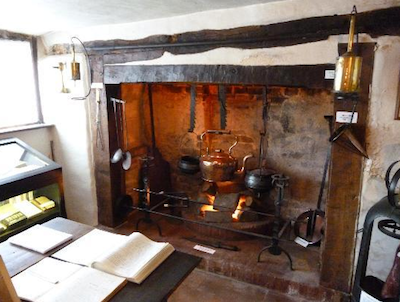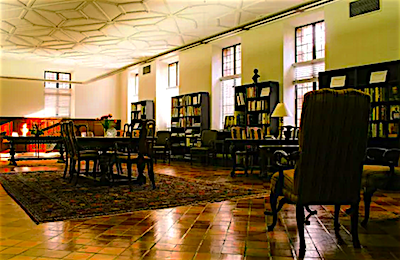Dark Angels in Conversation
Shakespeare & Company, Paris
Writing and place
Co-founder John Simmons in conversation with Associate Partner, Richard Pelletier
John: Place is always important to any writer. I mean a number of things by that. First, the places we go where the surroundings inspire writing, such as the locations for our courses. But second, and what I’d like to talk about here…the places where – after we return home from a Dark Angels experience – we find we are best able to write.I was thinking as well that people often arrive at one of our courses feeling uncertain, perhaps questioning “Am I a writer?” But in most cases they leave saying quietly but confidently “Yes, I am a writer”. So where do we then choose to write? A coffee shop in town or a shed in the garden? I’m always fascinated to hear from other writers, and to visit the houses where, for example, Dickens, Jane Austen, Herman Melville, Dylan Thomas, Ernest Hemingway wrote. Perhaps they shed light on our own writing practices?
Richard: Place is magic. I once lived a couple doors away from the lifelong home of H.L. Mencken, possibly the greatest American stylist after Mark Twain. The decision to live there was deliberate. Outside my windows: the H.L. Mencken fountain, encircled by bronze replicas of his books. What a place to begin writing, inspired by the man who said: “Democracy is the theory that the common people know what they want, and deserve to get it good and hard.” (Also: Edgar Allen’s Poe’s house was a few blocks away.)I remember visiting Monticello. I was awed by Thomas Jefferson’s writing ‘cabinet’ as he called his office. This was a space wholly dedicated to writing, to words. But you just could not escape the shackles – the monstrosity of the slave quarters.That’s a long way from Stumptown Café, where I spent several good hours yesterday, strangely impervious to noise and music, working on my book. What sorts of conditons inspire you? And whose writing spaces have you seen?
John: I try to visit writers’ houses wherever I go – or places associated with writers. A visit to New Bedford was a perfect accompaniment to reading Moby-Dick as it’s Melville’s whaling town and the place where the Seaman’s Chapel is. But the place I love most as a writer’s house is Milton’s Cottage on the outskirts of London (Chalfont St Giles was deep in the countryside when Milton escaped the plague there in the mid-17th century). It’s a poky little house, low-ceilinged, dark – I wrote about it in a book called Common Ground. The upstairs was inaccessible except by a rope, and that’s where the women of Milton’s household had their bedrooms. Milton by then was blind and infirm, so he never went upstairs, but he wrote the story of Paradise Lost, with its scenes of Heaven, Hell and the Garden of Eden in this tiny space. Perhaps not having sight helped him imagine. The lesson I took out of that is you can write anywhere. Roald Dahl’s shed and Dylan Thomas’ boathouse were very confined spaces. You don’t need to get your writing conditions spacious or luxurious, so I now enjoy writing in coffee shops, the British Museum, the Royal Academy and even on the London Underground. You forget where you are – except I find the buzz of noise and conversation in the background helps me focus more on my writing. And there’s home, of course, with different spaces. Do you have a room at home where you write?
Richard:
(As you know, I grew up next door to New Bedford, the location for our proposed first Dark Angels America course.)
Yes, I do have a writing space at home, but it's not ideal. I wish I could write anywhere. A lot depends on what I'm working on. Right now my new writing home is a godsend. It’s downtown, a 25-minute walk from my apartment. Folio: The Seattle Athenaeum. (I'm there so much, they put me on the website's home page.)
Milton’s Cottage
The Athenaeum is a Ben Franklin idea and is a kind of private library, a 'community of the book' for readers and writers. This room is where I work, usually alone. (I’m writing some of this at Folio.) Bookcases packed with literature, sunlight streaming through, good coffee nearby. The staff is friendly and warm and helpful — very inspiring place. I share the sentiment of several Seattle writers who told Folio staff that they were maxed out on cafes.
Folio, Seattle (seen at a previous location)
You and I spent some time together at the Royal Academy working on one of these conversations. What a thrill that was. You’re a man on the move — all over town and across the continent. I’m impressed that you can write anywhere. Keeping that in mind, how do you think about your own lovely writing loft and the role it plays in your writing?
John:
Strangely, perhaps, I use it sparingly. I keep it for best, as my mother would have said. That means Friday nights – reserved for writing for the last three decades as a now ingrained habit. So of course it’s now Friday evening and I’m in my loft, writing this to you. Outside the window a big black night sky, below at the horizon the lights of London; inside the loft I’m listening to Michael Nyman’s music for The Piano while writing. As opposed to writing ‘anywhere’, this is my space, I’m enclosed and I find it easy to concentrate here in a way that is never as intense at any other time or any other place in the week. This rounds off my week – but time zone differences, you still have much of the day before you.
Richard:
Time and place — among the eternal concerns of writers. Lovers, too. It was a couple of hours drive from Moniack Mhor. The last nine to ten miles on a winding, one track road with steep drops on either side. I'd just become a made man in our little society. Heart full, head happy. And I found myself, with my love, my wife, in a glorious cottage high above the Loch. Soon I was writing outside, in the swaying, rustling trees. And the breeze that day, let me tell you about the smell of the wind off the water, and the warmth of the sun, and the way the sunlight sparkled and fell on the worn planks under my feet...




